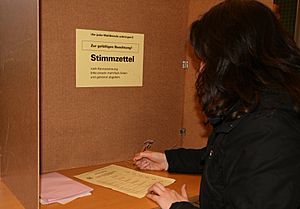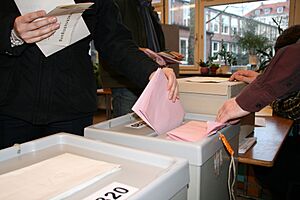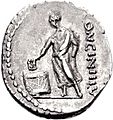Election facts for kids

An election is a special way for people to choose their leaders. It's how citizens pick who will represent them in a representative democracy or other types of government. Think of it like a big vote where everyone gets to have a say.
Most democratic countries hold elections regularly. These elections help choose people for their national legislature. A legislature is a group that makes laws. In countries like the UK, these chosen people are called Members of Parliament (MPs). They represent different local areas.
In some systems, the legislature then chooses the government. This is often done by a majority vote. Other democracies elect a president directly. This president then picks the people who will run the government. Many countries also have elections for local or regional leaders.
Contents
How Do Elections Work?
There are many ways to organize an election. How people vote can be very different from country to country. Voters might choose an individual person. Or, they might vote for a whole political party. This depends on the voting system used in that country.
Different Voting Systems
Each country has its own rules for how votes are counted. Some systems let you vote for just one person. Others let you choose a party, and the party gets seats based on how many votes it receives. These different methods are called voting systems. They aim to make sure everyone's voice is heard fairly.
Why Are Elections Important?
Elections are super important for a democratic country. They give people the power to choose their own government. This means citizens can decide who they want to lead them. If people don't like how things are going, they can vote for new leaders next time.
However, sometimes elections are not completely fair. This can happen if a government tries to control the results. For example, they might stop opposing candidates from sharing their ideas. When elections are not fair, they are sometimes called "sham elections." This means the choice isn't truly free.
The study of elections is called Psephology. Experts in this field analyze voting patterns and election results.
Images for kids
-
A ballot box used in France
-
Picture about the 1946 presidential election, when the parliament of Finland elected prime minister J. K. Paasikivi to succeed the resigning Mannerheim as new president with 159 votes.
-
Campaigners working on posters in Milan, Italy, 2004
-
Buenos Aires 1892: "The rival voters were kept back by an armed force of police out of sight to others. Only batches of two or three were allowed to enter the polling-office at a time. Armed sentries guarded the gates and the doors." (Godefroy Durand, The Graphic, 21 May 1892).
-
A ballot from the 1938 elections in Nazi Germany asking voters to approve the new Reichstag and the Anschluss. The "no" box was made significantly smaller than the "yes" box.
See also
 In Spanish: Elecciones para niños
In Spanish: Elecciones para niños











